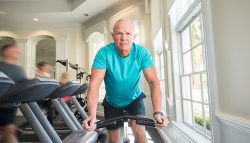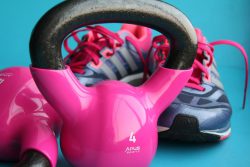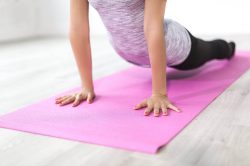Fitness-Centric Resolutions
The Truth About Fitness-Centric New Year’s Resolutions
When January 1st rolls around on any given year, people often hit the gym — climbing stairs, running on treadmills and peddling bikes like they their lives depend on it. But then, February comes and goes, and like magic, the gym significantly empties out and diet dreams die. So, while we can count on weight loss and exercise to remain at the top of every New Year’s resolution list that the internet can handle, Golden Ocala Golf & Equestrian Club is eternally curious about the difference between folks who go from gym rat to gym dropout and those who become a permanent staple in the fitness center.
Why Does Fitness Fail?
To answer this question in the most clear and concise manner possible, we turned to the experts and did not have to look very far. Jeff Spaeth is a certified personal trainer and licensed massage therapist who specializes in sport massage and workouts for Golden Ocala members ages 50+, while Linda Doyle is a certified personal trainer and women’s fitness expert who specializes in developing goal-oriented individualized fitness programs for Golden Ocala’s female members.
Since they live the life that few resolution makers ever truly experience, Spaeth and Doyle had a lot to say about the failure rate that is so often associated with this all-too-common fitness phenomenon.
To start, they use an easy-to-remember acronym — CLIFF – which stands for the following:

C – Can’t find the time
L – Lacking a game plan to keep you going
I – Ignoring your commitment and falling into old patterns
F – Frustrated with lack of early results
F – Forgetting why you started in the first place
How This Can Change
CLIFF may be five obvious reasons that 45% of Americans make a resolution to start working out, but only 14% of people over 50 keep their resolutions past two months. This happens when people tend to make fitness a resolution instead of a goal. At the end of the day, resolutions are not precise.
Precise meaning, every fitness-centric undertaking must have a goal, timeframe and outcome. It’s not whether you want to lose weight, but knowing how much weight you desire to lose, why you desire to lose it and why losing it now will be different from losing it yesterday or tomorrow. For example, someone may want to slim down for an upcoming wedding or to fit into an outfit that’s been hanging in the closet for months.
“After someone establishes the drive, it’s time for a realistic course of action,” added Spaeth.
Attainable results do not come by working out every day if one never has worked out before, or by giving up soda, salt and sugar all at once, for example. All that brings is misery, and all that misery does is burn someone out and send him or her further and further away from a fitness-motivated life.
People must start small — maybe they give up soda for 30 days and then add something else to their elimination list 30 to 60 days later. Maybe they start by working out for 30 minutes and build up to two hours.

How The Process Works
While developing and remembering a fitness motive brings you one step closer to making improvements, many people need that motivator to stare them in the face on a daily basis. This may be a picture on the closet of that dress you so badly want to fit into. This could also mean pasting a picture of yourself and someone you want to look like on the cabinet you often open for access to cookies and other snacks. This is the preparation part of the five stages of change developed in 2011 by sports and exercise psychologists — Norcross, Krebs and Prochaska:
- Pre-contemplation
- Contemplation
- Preparation
- Action
- Maintenance
“The pre-contemplation and contemplation elements are part of the resolution that many people create,” Spaeth said. “Preparation is something that many people skip over. Therefore, action never transitions into maintenance.”
But Golden Ocala members and others have the ability to follow these steps in order and avoid CLIFF with the aforementioned tips from Doyle and Spaeth, as well as call upon them and trainers like them to assemble a program based on their specific needs and physical abilities.
For more information and to find out how experts can help you help yourself, call the Golden Ocala Fitness Center at (352) 629-6229.